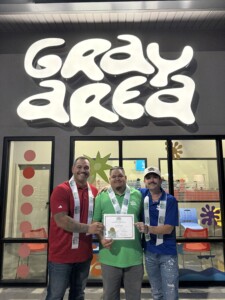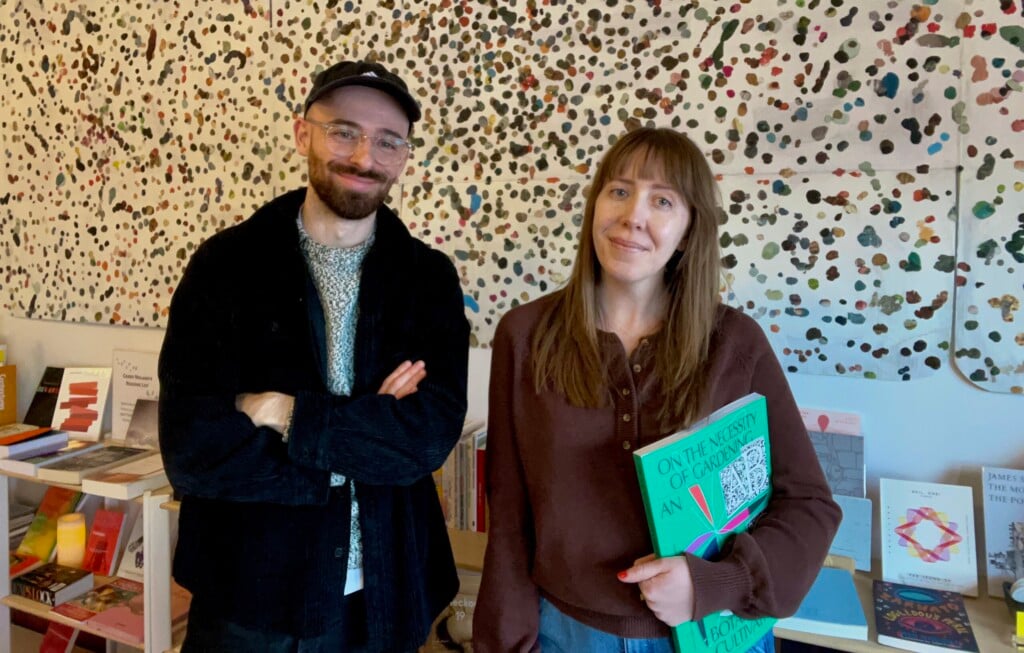Gray Area Cannabis in Independence clears the smoke of their precarious balancing act
Cannabis confusion is real. Between hemp and marijuana, it’s easy to get lost in the weeds, ruining your high. Cannabis plants, including both hemp and marijuana, belong to the same species, cannabis sativa. While they may look similar, they differ in key ways, particularly in their effects and uses. To put it in perspective: While a poodle and a German shepherd are both dogs, they have their obvious differences.
The main difference between the two is their percentage of THC, the psychoactive compound that causes the “high” associated with marijuana. Marijuana contains high levels of THC—usually around 20%—making it popular for both recreational and medicinal use. Hemp contains less than 0.3% THC, making it non-psychoactive in most forms.
Hemp has been around for centuries, primarily used for industrial purposes. Hemp fibers are used in products like clothing, rope, and paper. Hemp has also gained attention for its high cannabidiol (CBD) content. CBD is a compound that doesn’t produce a high but rather offers medicinal benefits like reducing anxiety or alleviating pain.
Although hemp is low in THC, it still contains THCa—the precursor to THC. THCa is not psychoactive in its natural state. It only becomes active and capable of producing a high through combustion (such as when smoked or vaped). This heating process, called decarboxylation, converts THCa into THC.
However, the legal status of THCa can be confusing. It looks like marijuana, it smells like marijuana, but it’s not. Under the 2018 Farm Bill, THCa is legally considered hemp as long as it contains less than 0.3% THC, even though it can become psychoactive once heated. This creates a gray area where products made from hemp—such as those sold in certain smoke shops—are technically legal.
The Farm Bill legalized hemp farming across the United States by removing hemp from the list of controlled substances. While this was a major win for the hemp industry, it also created significant challenges in regulating the market.
In states like Missouri, unclear regulations have created a wild west for hemp sales. Calls for transparency in THC limits, testing, and labeling are stalled by regulatory disagreements, delaying enforceable rules. This lack of regulation has caused confusion among consumers, farmers, and businesses. Without clear standards for growing, processing, and selling hemp, businesses operate with little oversight, and consumers risk purchasing unsafe or mislabeled products.
One of the most alarming aspects of this regulatory void is the lack of age restrictions. Since no state or federal law explicitly prohibits the sale of hemp products to minors, stores are not required to enforce age restrictions unless they choose to. This opens the door for children to easily access products that may not be intended for their use, raising serious concerns about public safety.
Another concern? The absence of required testing for THCa products means harmful substances like pesticides or heavy metals could be present in products sold to consumers, and there’s no guarantee that products contain what they claim.
In the midst of this uncertainty, Gray Area Cannabis in Independence is stepping up to lead by example. Founded in 2024 by Brycen Mackison, Jericho Heese, and Max Ayalla, Gray Area is a deli-style smoke shop specializing in THCa products. With each of them having experience in the cannabis industry, they identified a gap in the hemp market and positioned themselves to fill it. Gray Area aims to provide a safe, transparent space for consumers to purchase cannabis affordably.
This drive towards transparency can be seen in how they sell their product. They say deli-style allows them to better connect with customers and increases product transparency. “You’re doing the quality control yourself as a consumer. You get to see it and smell it before we package it up,” says Heese. Rather than purchasing pre-packaged flower in standard sizes, deli-style allows the staff at Gray Area to measure out the desired amount a customer wants to purchase from a bulk flower batch.
In addition, Gray Area is committed to sourcing from farms and growers that provide Certificates of Authenticity (COAs). “We only collaborate with reputable, hemp-focused testing labs,” explains Ayalla. “These labs are less likely to misclassify or cross-contaminate products, which is especially important in an unregulated market.” Gray Area publishes the COAs for every strain they sell, allowing consumers to verify that their products have been thoroughly tested for quality and potency.
Since Gray Area sells hemp rather than marijuana, they benefit from more lenient tax regulations. Hemp products are not taxed as heavily as marijuana, meaning customers avoid hefty sales taxes, which lowers the overall cost of their purchases. Additionally, unlike marijuana, there are no purchase limits, which may be an incentive for a consumer to choose their business rather than a licensed dispensary—Customers are free to buy as much as they need without worrying about restrictions that exist for marijuana products.
In Missouri, medical marijuana users are allowed to purchase up to six ounces per month, taxed at a rate of 4%. Recreational marijuana consumers are limited to three ounces per transaction, taxed at 6% plus any applicable local taxes. Gray Area’s hemp products avoid these limitations and taxes, making it a more affordable option for many.
And they don’t lose sleep over concerns about the potential closure of the hemp loophole that allows their business to operate freely. “We understand the risks of an unregulated market,” Heese says.
And just because there are no rules doesn’t mean the guys at Gray Area are running a free-for-all. “We operate as if strict regulations were already in place—ensuring age restrictions and full product testing transparency,” Heese says. Unlike some businesses in the industry, Gray Area is committed to restricting sales to only adults aged 21 and up. They require multiple ID checks throughout the purchasing process—similar to licensed dispensaries—ensuring every transaction puts products in the right hands.
Although they opted not to reveal specific sourcing details, Gray Area says they carefully select their products and sources. “We consistently work with the same trusted farms and growers, each of whom has passed a rigorous selection process to ensure the highest quality and consistency of our flower,” Ayalla says.
Despite Gray Area’s attempts at maintaining transparent business practices, the company has faced criticism from those who dismiss its products as synthetic or not real cannabis. “None of our products are synthetics; We’re not dealing with Delta-8 or HHC or any of those products that you’ll often find in smoke shops,” says Heese.
As members of the Missouri Hemp Trade Association, the owners say that they are committed to working with lawmakers to promote a more regulated and transparent hemp industry. “We want to help guide the industry toward greater regulation,” says Ayalla, “so that it can continue to grow in a safe, sustainable way.”
As the hemp industry grows, businesses like Gray Area show that a regulated, transparent market is not only possible—It’s necessary. Their commitment to high standards reminds us that despite cannabis confusion, there are those working to clear the smoke and ensure a safer, more transparent experience in the hemp space.
Click below to read the April 2025 Issue of The Pitch Magazine:








